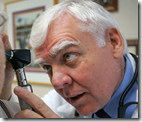This was an interesting article to see on the web this week, in one instance to see a physician on the NYTimes that my mother for a short time years ago had seen as her primary care MD, and this goes back to the days when HMOs were still in their organizational days. Nice publicity for Dr. Dearing. More importantly though is the continued effort of trying to create a better working atmosphere for both the patients and doctors through the Medical Home. As the article states, IBM has been increasingly not happy with the “bang for their buck” in what they are providing employees for health care, thus a birth of a new pilot program, in Arizona this time as it was met with mixed emotions in Florida.
This is interesting in the fact that UnitedHeatlhCare, who just paid a big fine in New York recently and is closing a business intelligence unit that was incorrectly assessing health insurance claim information that made over a billion dollars last year is shifting directions, maybe, with offering expertise in some other areas? United Healthcare has had issues over the years and has initialized campaigns to be more “user friendly” in the past as well, due to so many rough edges with providers.
What is also interesting is the fact that that this particular office does not use electronic medical records, but yet consultants are going to work and try to figure out how to keep statistics on chronic diseases such as diabetes. Yes you can use computers and another “registry” program to capture all this data, but that ends up being additional work for the staff in the long run, might as well bite the bullet and get electronic medical records to do it right from the start as those systems have a registry feature built in that does this. I know, years back I wrote an EMR software program and included the registry as part of the reporting functions necessary for when the EOB statements are received to go back and check for floating or missing patients on the capitation lists for one thing, plus again to see the over stats on how effective the practice is in working chronic diseases. Why doesn’t United just buy the practice an EMR system to help advance and move things forward and IBM would probably be happier to have medical records done in a digital fashion as well, I don’t think they would object as they themselves have a lot of research and time invested with Electronic Records, since this pilot is set up to hopefully address the concerns of IBM employees getting quality healthcare, or maybe IBM could chip in too for an EHR to improve patient care.
Hopefully the management fees paid to the office will allow the practice the time and compensation to better manage patient care, but again, done by hand, that’s a lot of time, get the electronic medical records system and cut to the chaise as it’s going to be a time consuming task with manually retrieving the data. BD
An earlier trial of the model by UnitedHealth, in Florida, never got off the ground because doctors refused to participate. This time, however, the insurer is teaming up with seven doctors’ groups to make another attempt, in Arizona, at the prodding of one of the state’s big employers, I.B.M.
UnitedHealth will try giving doctors more authority and money than usual in return for closely monitoring their patients’ progress, even when patients go to specialists or require hospitalization. The insurer will also move away from paying doctors solely on the basis of how many services they provide, and will start rewarding them more for the overall quality of care patients receive.
Many Florida doctors said they thought the insurer was asking them to do too much on faith. They were particularly skeptical about working with UnitedHealth, which has a reputation of being a tough negotiator and slow to pay claims.
The experiment is also intended to see whether even small groups of doctors can serve as a medical home for patients. As a solo practitioner, for example, Dr. Dearing does not use electronic health records, like a majority of doctors today. But he and the consultants say they hope he can nonetheless devise a way to effectively track the welfare of the nearly 400 diabetic patients he treats by creating a registry, or database.
While Mr. Berenson says he sees promise in the medical home concept, he worries that small doctors’ offices will find it too difficult to make the necessary changes to succeed.
UnitedHealth and I.B.M. Test Health Care Plan - NYTimes.com
Related Reading:



0 comments :
Post a Comment